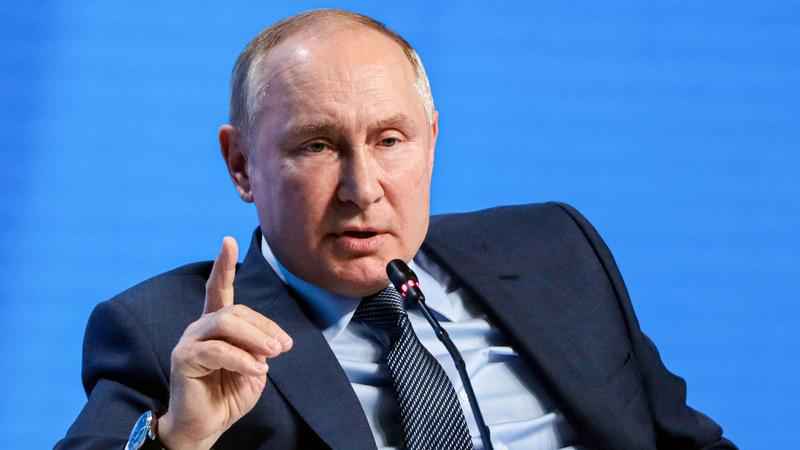Putin says relations with Biden "working and stable"

Russian President Vladimir Putin gestures while speaking at the plenary session of the Russian Energy Week in Moscow, Russia, Wednesday, Oct. 13, 2021.[Mikhail Metzel, Sputnik, Kremlin Pool Photo via AP]
Russian President Vladimir Putin said Wednesday that the Kremlin has "constructive" relations with Washington and voiced hope that mutual interests would eventually help normalize U.S.-Russia ties.
Putin, speaking during a panel discussion at an international energy conference in Moscow, also said that Russia stands ready to boost natural gas supplies to help assuage nervous energy markets in Europe, insisting that his country wants prices to remain stable.
He angrily rejected the allegations from some European experts and politicians that Russia has been holding up gas deliveries and causing energy prices to spike as "baseless political chatter," noting that Russian gas supplies have risen 15% over the year and are set to reach another record.
He noted that while Russia boosted supplies, the U.S. reduced liquefied natural gas supplies to Europe because of high demand in Asia.
"The claims that Russia has used energy as a weapon is sheer nonsense and ravings," he said. "We are increasing supplies as much as our partners are asking us."
Putin argued that the newly built Nord Stream 2 gas pipeline to Germany, which bypasses Ukraine under the Baltic Sea, would be preferable to consumers because it’s 2,000 kilometers (1,240 miles) shorter than the Ukrainian route, resulting in lower gas prices.
The Russian leader added that Gazprom could extend the gas transit contract with Ukraine that expires in 2024, but noted what he described as a pitiful state of the Ukrainian pipeline network.
"Its gas transportation system hasn’t seen any repairs for decades," he charged.
Ukraine in the past has rejected such Russian criticism of its pipeline system and accused Moscow of trying to deprive it of $2 billion in annual transit fees for pumping the Russian gas to Europe. The two neighbors have been at sharp odds since Russia’s 2014 annexation of Ukraine’s Crimean Peninsula.
The Russian leader also rebuffed criticism of an ongoing domestic crackdown on dissent and independent media.
Putin strongly defended a Russian law requiring those who receive foreign funds and engage in unspecified political activities to register as "foreign agents," describing it as a quid pro quo response to a U.S. law used on Russian media in the United States.
Critics say the Russian law has been used to muzzle critical media outlets since the "foreign agent" stigma has strong pejorative connotations.
Dmitry Muratov, who won the 2021 Nobel Peace Prize on Friday for his work as editor of the independent Russian newspaper Novaya Gazeta, wondered if authorities would designate his paper as a "foreign agent."
Asked Wednesday if that was a possibility, Putin responded that Muratov shouldn’t worry "if he doesn’t violate the Russian law."
Putin also spoke scathingly of imprisoned Russian opposition leader Alexei Navalny, charging that he was trying "to get business advantages by shielding himself with political activities." As per his custom, Putin did not mention Navalny by name.
Navalny, Putin’s most adamant political foe, was imprisoned this year after returning to Russia from Germany, where he had been recuperating from nerve-agent poisoning that he blames on the Kremlin. The Kremlin denies the accusation. He received a 2½-year prison term for violating the terms of a suspended sentence from a 2014 embezzlement conviction that he dismissed as politically motivated.
Commenting on Russia-U.S. ties, Putin said Russia’s relations with the Biden administration have been "quite constructive" and he personally has developed "working, stable relations" with President Joe Biden.
"Mutual interests will undoubtedly lead to the normalization of our ties, and the American political establishment will stop speculating on the Russian-U.S. relations to the detriment of their own interests," he said, noting that the two nations have shared interests in arms control, fighting terrorism, money laundering, and stabilizing energy markets.
Putin added that Russian diplomats and visiting U.S. Under Secretary of State Victoria Nuland discussed possible further contacts between the two presidents following their June summit in Geneva.
In comments tweeted by the U.S. Embassy in Moscow, Nuland said she "very much appreciated the frank, productive review of U.S.-Russia relations" with Putin’s foreign affairs adviser, Yuri Ushakov, on Wednesday, adding that "we remain committed to a stable, predictable relationship."
The Kremlin hasn’t yet said whether Putin would travel to Rome to attend the Group of 20 summit later this month, which Biden is to attend.
Asked about Russia’s efforts to develop new weapons, Putin said they came as a response to Washington’s 2002 decision to withdraw from a Cold War-era treaty that banned defenses against ballistic missiles. He noted that "an arms race is ongoing," but added that Russia was ready to discuss its new weapons at arms control talks with the U.S.
Turning to climate change, Putin said that Russia has stuck to its obligations to cut greenhouse gas emissions and would aim for net zero carbon emissions by 2060.
The Russian leader noted that Russia has been hit by global warming more than others, seeing its average temperatures rise 2.5 times faster than a global average.
"And the Arctic is warming up even faster," he added.
While most industrialized nations are aiming to achieve that by 2050, the announcement marked a major step by Russia, which has sought to pursue the global climate agenda without hurting its economy.